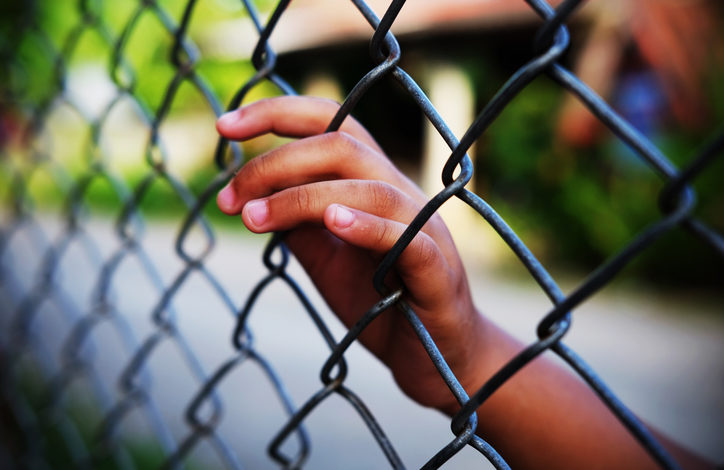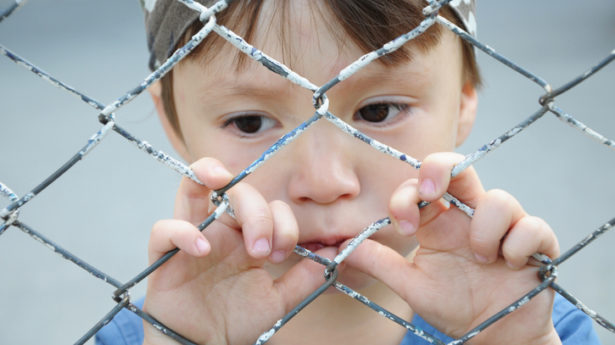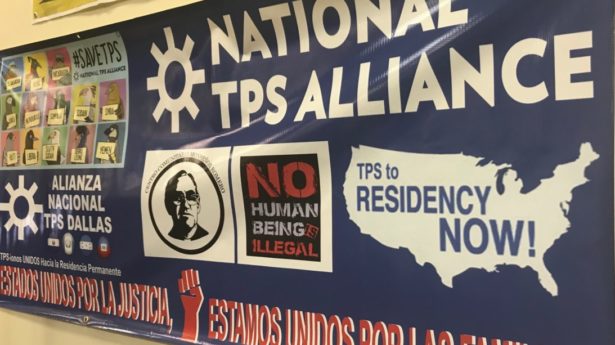The Unitarian Universalist Service Committee advances human rights through grassroots collaborations.
Homes Instead: My Look Inside the Homestead Migrant Child Detention Center

By Rev. Dottie Mathews on March 25, 2019
Reverend Dottie Mathews was approached by the Department of Health and Human Services to tour the Homestead detention facility, the largest child migrant shelter in the United States. This is her reflection on the experience.
As our car turned into the parking lot of the Homestead Temporary Housing Facility, the largest detention center for migrant children in the country, I could see protesters at the front gate holding signs proclaiming, “Shut it down,” “Free them,” and “Homes instead.” I felt both gratitude for their presence and a pang of uncertainty, feeling like I belonged on the sidewalk with them far more than on an official tour for faith leaders by the U.S. Department of Health & Human Services’ (HHS) Center for Faith and Opportunity Initiatives. I also knew an inside view would be important. I was surprised to even receive the invitation to join the small group consisting primarily of conservative Christian clergy, as a Unitarian Universalist minister and clergy representative of the Unitarian Universalist Service Committee who has organized extensively in opposition of child detention.
The Florida-based Homestead facility is not just the largest child migrant shelter, it’s the only one run by a for-profit company and the only one currently operating as an “emergency influx shelter,” which exempts them from the same standards and oversight as licensed shelters for unaccompanied minors.
HHS’s Center for Faith and Opportunity Initiatives wanted to reassure us of the high-quality conditions inside of the shelters, but we knew that was the wrong story. The conditions inside matter, of course, but more crucial are the unjust and cruel policies that have resulted in the existence and expansion of these shelters in the first place.
There has been no sudden surge of unaccompanied minors – the 500% increase since 2017 of migrant children in shelters, at a high of over 14,000, is a manufactured crisis resulting from heartless policies of family separation and sharing information about children’s sponsors with Immigration and Customs Enforcement (ICE). There is no surge of children coming alone – in fact, many who have been identified as “UAC’s” (Unaccompanied Alien Children) were actually taken from their loved ones at the border. We need a system that centers the well-being of kids, keeps families together, and does not merge the care of vulnerable young people with immigration enforcement.
After visiting Homestead with its institutional, tight controls on the nearly 1,600 children there, we also visited two smaller licensed shelters, Boys Town and His House. The visible difference was palpable. While the smaller shelters have real classrooms run by certified teachers with materials and books, at Homestead the “math class” we observed had more than 30 docile teens at tables in front of a screen displaying math problems. There were no books (aside from Spanish/English dictionaries), no instruction taking place, and the teenagers were doodling idly on the papers in front of them as an adult leaned against the wall. The classrooms at the smaller shelters resembled closely any typical public school classroom. The smaller shelters also had personalized bedrooms with colorful decorations and personal knick-knacks. In contrast, Homestead had dormitories for the 17-year-old boys with 144 beds, every bed the same, with lockers under the bunks to secure belongings.
The smaller, licensed shelters are far from perfect – nothing highlights that more than the recent leak of thousands of complaints of sexual abuse occurring within the 100 shelters nationally. Much stronger, more frequent, and far more transparent oversight is needed at all of these shelters.
In all three of the shelters visited that day, we met dedicated staff who showed genuine concern for the children. And yet we saw how their hands were tied in some cases by our current anti-immigration policies. We witnessed this powerlessness at His House Shelter, where we saw “transport officers” arrive at the front desk. Someone had turned 18, and despite the shelter staff’s efforts to secure a safe alternative they were “aging out.” At Homestead, we learned that 91 youth so far have aged out and been transferred after their birthday to deportation proceedings in adult immigration detention.
I was so grateful that at the end of that long day; I and a few others from the tour group had a chance to share dinner and deep conversation with Mariana Martinez and Lis-Marie Alvarado from American Friends Service Committee in Miami, part of the local coalition that held a press conference outside of the Homestead facility and launched a campaign to shut it down.
Mariana, a Homestead native who grew up with the city’s strong farmworker and immigrant rights movements, expressed:
“This child detention center is an insult to the community. It’s a slap in the face that the name of our proudly immigrant hometown is suddenly synonymous with migrant child detention. These are children that look like us, like our kids, and it hits us in the heart. They are from places our families are from. These children need to be reunited with their families or sponsors. They belong in schools and in our communities.
As a local coalition of organizations and concerned community members we want to shut this place down and make sure these emergency influx shelters don’t open anywhere else – but we also want to make our community and economy better. We deserve ways to support our families that don’t require profiting off of the suffering of migrant children. We want the government to divest from detention and invest in the community. Better jobs, better education and training. This local dependency on the jobs at this detention center, which were always meant to be temporary anyway, are just one more way the people of Homestead are being exploited. We need economic opportunities that are more sustainable and returns resources to the community.”
Instead, domestic corporations like Caliburn International, the parent of the for-profit company that owns and operates the Homestead center, have reaped huge financial benefits from imprisoning and monitoring asylum seekers. Caliburn had filed with the Securities and Exchange Commission in October 2018, preparing a public stock offering of $100 million. However, the same day as our tour and a local protest, they withdrew their plans, citing the “variability in the stock markets.” Clearly, the moral hazard of profiting off detaining refugee children, and the blow to their public image as awareness and protest grew, impacted that “variability” for them.
Similarly, J.P. Morgan Chase just announced that they will no longer finance the private prison industry, a sign that these shifts away from for-profit incarceration are part of a larger trend and successful community organizing.
Only when Homestead is shut down and HHS agrees not to open any more influx shelters for kids, when the remaining forms of family separation end, and when ICE no longer receives data about children’s sponsors, will we begin treating migrant and refugee children with the care and respect they deserve.
Rev. Dottie Mathews is a Unitarian Universalist Minister from Columbia, Missouri and a clergy representative for the Unitarian Universalist Service Committee.
Photo Credit: iStock – Chatiyanon
***
About UUSC: Guided by the belief that all people have inherent worth and dignity, UUSC advances human rights globally by partnering with affected communities who are confronting injustice, mobilizing to challenge oppressive systems, and inspiring and sustaining spiritually grounded activism for justice. We invite you to join us in this journey toward realizing a better future!

